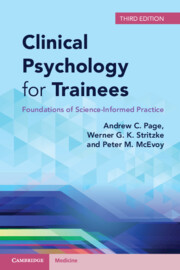Book contents
- Clinical Psychology for Trainees
- Clinical Psychology for Trainees
- Copyright page
- Contents
- Chapter 1 A Science-Informed Model of Clinical Psychology Practice
- Chapter 2 Relating with Clients
- Chapter 3 Assessing Clients
- Chapter 4 Matching Treatments and Monitoring Client Progress
- Chapter 5 Linking Assessment to Treatment: Case Formulation
- Chapter 6 Treating Clients
- Chapter 7 Brief Interventions
- Chapter 8 Low-Intensity Psychological Interventions
- Chapter 9 Group Treatment
- Chapter 10 Programme Evaluation
- Chapter 11 Case Management
- Chapter 12 Supervision
- Chapter 13 Managing Ruptures in Therapeutic Alliance
- Chapter 14 Respecting the Humanity of Clients: Cross-Cultural and Ethical Aspects of Practice
- Chapter 15 Providing Therapy at a Distance and Working in Rural and Remote Settings
- Chapter 16 Psychologists as Health Care Providers
- Chapter 17 Working in Private Practice – Dr Clair Lawson; Clinical Psychologist and Director; Lawson Clinical Psychology
- References
- Index
Chapter 5 - Linking Assessment to Treatment: Case Formulation
Published online by Cambridge University Press: 14 April 2022
- Clinical Psychology for Trainees
- Clinical Psychology for Trainees
- Copyright page
- Contents
- Chapter 1 A Science-Informed Model of Clinical Psychology Practice
- Chapter 2 Relating with Clients
- Chapter 3 Assessing Clients
- Chapter 4 Matching Treatments and Monitoring Client Progress
- Chapter 5 Linking Assessment to Treatment: Case Formulation
- Chapter 6 Treating Clients
- Chapter 7 Brief Interventions
- Chapter 8 Low-Intensity Psychological Interventions
- Chapter 9 Group Treatment
- Chapter 10 Programme Evaluation
- Chapter 11 Case Management
- Chapter 12 Supervision
- Chapter 13 Managing Ruptures in Therapeutic Alliance
- Chapter 14 Respecting the Humanity of Clients: Cross-Cultural and Ethical Aspects of Practice
- Chapter 15 Providing Therapy at a Distance and Working in Rural and Remote Settings
- Chapter 16 Psychologists as Health Care Providers
- Chapter 17 Working in Private Practice – Dr Clair Lawson; Clinical Psychologist and Director; Lawson Clinical Psychology
- References
- Index
Summary
Case formulation links the client and his or her problems with the treatment.It captures both the strengths and the weaknesses in a complete summary of the client. The chapter introduces case formulation by first describing a behavioural case formulation and how a functional analysis can be conducted. The illustration of a behavioural formulation is then developed into a model that goes beyond identifying the antecedents and consequences of behaviours, and includes reference to the potential of mediation by thoughts and beliefs. Thus, a broader cognitive-behavioural model of case formulation distinguishes steps: (i) presenting problems, (ii) predisposing factors, (iii) precipitating variables, (iv) perpetuating cognitions and consequences, (v) provisional conceptualization, (vi) prescribed interventions and (vii) potential problems and client strengths. The chapter then provides two clinical examples of case formulation, beginning with a cognitive-behavioural case formulation then an example from the perspective of interpersonal psychotherapy. The chapter concludes with a discussion of transdiagnostic approaches to assessment and case formulation.
Keywords
- Type
- Chapter
- Information
- Clinical Psychology for TraineesFoundations of Science-Informed Practice, pp. 63 - 95Publisher: Cambridge University PressPrint publication year: 2022

